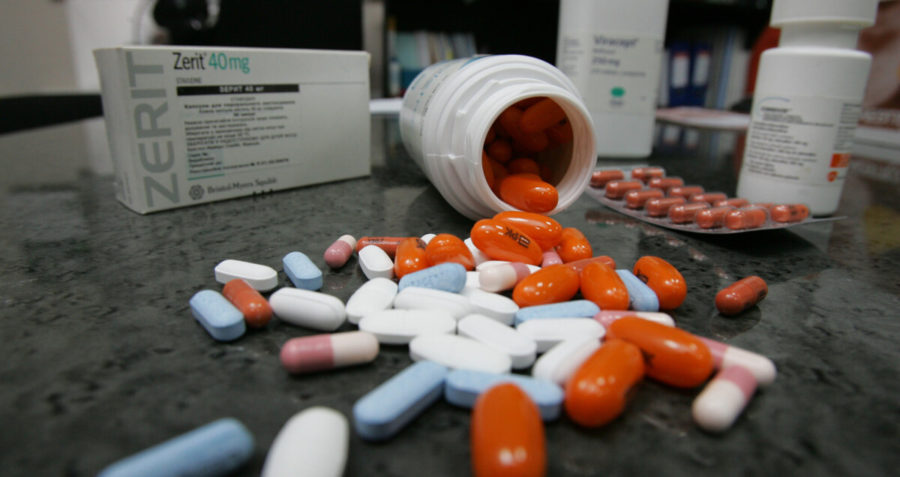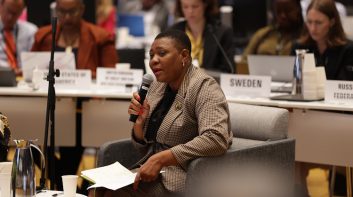Lung health and HIV: why communities are key in the COVID-19 era
 © Frontline AIDS/Natalia Kravchuk 2016
© Frontline AIDS/Natalia Kravchuk 2016
From 20-24 October 2020, the world’s largest gathering on lung disease will take place – and COVID-19 will take centre stage.
Not only will coronavirus restrictions see the 2020 Union World Conference on Lung Health (20-24 October) take place virtually, COVID-19’s impact on tuberculosis – still the biggest killer of people living with HIV – will be a key focus. As the World Health Organization warns of a dramatic increase in TB deaths due to COVID-19 these discussions couldn’t be timelier.
Frontline AIDS and partners will lead various sessions to share experiences and evidence from these past turbulent months. We will show how communities most affected by HIV and TB are using their expertise and insight to adapt to the current challenges of COVID-19 to sustain progress on both diseases, particularly among marginalised groups.
The consequences of COVID-19
Research on the way COVID-19 is affecting TB services in seven West and Central African countries will be presented by Alliance Cote D’Ivoire and the DRAF-TB cross-country platform during a ‘Community Connect’ session. These pre-recorded sessions are free to join, meaning a wider audience can contribute.
Findings indicate that COVID-19 is having a devastating impact on TB diagnosis as people avoid testing facilities, fearful of getting COVID-19. Community workers are doing their best to identify people with undetected TB in their homes and refer them for testing, but even this is proving difficult as people look to limit contact with others.
Sensitising activities and personal protective equipment have been helpful in re-establishing contact between communities and community workers. We are now seeing a rising number of people testing positive for TB in community settings, and the number of undetected cases is also likely to be rising.
Finding solutions
This year, progress on targets agreed at the 2018 UN High Level Meeting on TB, including those addressing HIV and TB-coinfection, are being reviewed by the UN Secretary General.
Although COVID-19 has seen progress stall, in a number of sessions we will show how adapted community-led responses are getting things back on track, particularly among marginalised communities. In particular, we will examine how integrating TB, HIV and other co-morbidity services, and strengthening accountability mechanisms, are proving effective.
Governments need to recognise that TB and HIV prevention, testing and treatment are essential, and ensure there are enough staff, resources and supplies to continue TB and HIV services uninterrupted during the COVID-19 pandemic. We will show what needs to change, and change quickly, so communities are better supported to lead the charge on tackling TB and HIV co-infection in the current climate.
Breaking the cycle of incarceration and tuberculosis
In prison, people are at risk of contracting TB, hepatitis C, HIV, and now COVID-19, with serious consequences for people’s lives and public health. Worldwide too many people are incarcerated for minor drug offences. There is a desperate need for more countries to actively reject punitive drug-control policies in favour of public health-focused policies.
Our partners across different countries are delivering community-based harm reduction services that are safe and effective in preventing HIV and TB. During COVID-19 lockdowns, several governments introduced take home methadone services, something we welcome and are asking governments to sustain.
More governments, alongside donors and UN partners, need to make public health and human rights core components of their responses to HIV, TB and COVID-19. In a must-see conference symposium with the Global Commission on Drug Policy we will bring together people who use drugs from Asia and Africa, global activists and leaders to show how health-focused drug policies can reduce incarceration and stop TB spreading in prisons.
A growing focus on communities
In recent years, there has been growing acknowledgement of the effectiveness of communities in addressing TB and improving lung health. This is an encouraging trend, as are the synergies between scientific and community tracks in this conference.
It is now of upmost importance to recognise the essential work that communities on the frontline of HIV and TB responses are doing to tackle COVID-19 alongside TB and HIV co-infection. The Union conference will bring this work into the spotlight and show why it is vital that these community organisations are provided with the financial resources, political and technical support and equipment they need to continue to adapt to COVID-19.
About the conference
We are inviting you to register for our open access workshop ‘Accelerating progress to end tuberculosis: integration between tuberculosis, HIV and other services addressing comorbidities; and strengthening the accountability mechanisms’. Register by 23rd of October and let us know whether you need interpretation to French, Russian or Portuguese.
Registration for the open access Community Connect sessions is now open on the Union Conference website. The programme for Community Connect is also now live at the same link.
Join the debate by sharing your comments and questions on Twitter using @frontlineaids and @UnionConference.
Frontline AIDS has worked with Alliance Cote D’Ivoire, Alliance for Public Health in Ukraine, India HIV/AIDS Alliance and KHANA to co-organise conference sessions. For Track 2 of the Community Connect strand we have partnered with Francophone TB platform (DRAF-TB), Global Coalition of TB Activists, STOP TB Partnership, Swaziland Migrant Mineworkers Association, West African Regional Network and Central African Regional TB Network. We thank partners for this collaboration.
Further Reading
Tags
COVID-19Tuberculosis (TB)




